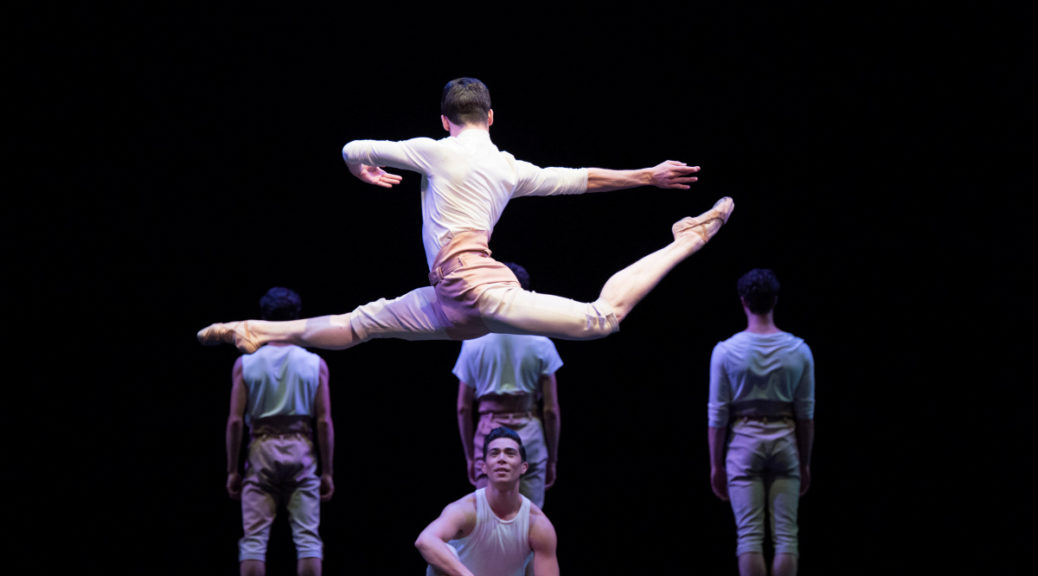
THIRD SET OF PREMIERES: MORE BALLET DIVERSITY
The third segment of the S.F. Ballet’s remarkable rapid-order clutch of a dozen world premieres this spring offered surprise and adventure. It showed in Program C that a traditional abstract ballet can indeed radiate affection; that the SFB has an amazing roster of (unsung) males; and that an American troupe can hatch a first-rate Spanish ballet.
The Spanish ballet created by Annabelle Lopez Ochoa rang with atmosphere and authenticity, displaying somber glimpses of the bullfight culture, with pas de deux couples wearing small horns like tiaras and dancing up a furious storm to dark steel percussion and classical guitar, under an ominous blood-red moon almost bursting on high (designs of Alexander V. Nichols). The dazzling leads in this drama were Dores André (Spanish) and Vitor Luiz (Brazilian) in the first pairing, and Myles Thatcher with Julia Rowe barely a step behind.
As vibrant as this ensemble piece was in “Unbound C,” miscalculations crept in. The score by multiple composers broke off into irrelevant and innocuous salon piano score serving as finale, like a little spring-break side trip to a beach resort. It seemed to say, the foregoing was all make-believe. I also have misgivings about the ballet’s misleading title, “Guernica,” as the work never approaches, not even obliquely, the horror of the historic air attack on civilians in that town during the Spanish Civil War eight decades ago.
Trey McIntyre showed off the SFB’s strong male contingent in “Your Flesh Shall Be a Great Poem.” The work was framed with Benjamin Freemantle alone on stage with powerful solos at start and end. He came on in the finale stripped down as if imitating Michelangelo’s “David” statue. In between, a phalanx of a half dozen men ranged about in admirable unison through a joyous, exuberant foray that, McIntyre explains, was inspired by recollections of his grandfather. (That could explain the child-like scenes of girls as well as the simplistic playroom music).
Soloist Freemantle at the end paired with a stool which was last seen trying to kiss him. Never a dull moment at the ballet!
On the surface, the Australian Stanton Welch’s “Bespoke” suggested a conventional modern ballet from a half-century ago. But Welch as usual had surprises up his sleeve: A silent solo for Angelo Greco, for starters. Then, well into the ensemble fabric to the sounds of a Bach violin concerto, a pas de deux becomes a display of affection between snuggling couples highlighted by the clinging-vine role of Mathilde Froustey. Bottom line: our abstract ballets need not always be scrubbed free of emotion.
SFB guest conductor David Briskin tastefully led a small instrumental ensemble in the Bach, with violin soloist Cordula Marks.
Even before seeing the fourth and final “Unbound” program, I’d have to say these new pieces were a knockout, well worth the (near-superhuman) effort, with enormous variety: some on pointe, some not; some folksy, some sophisticated; some ballerina-dominated, others not at all; some with story line, others not; some with orchestral music, some electronic, some pop, some decidedly futuristic in sound. Not a dud among them. Two of the strongest statements were created by women, still rarely encountered in most ballet choreography. Among the first three programs, the “Unbound B” one lingers longest and strongest in memory.
“Unbound C,” part three of festival program of 12 new works, April 20-May 6, by San Francisco Ballet, with review of D still pending. Opera House, S.F. For info: (415) 865-2000, or go online.